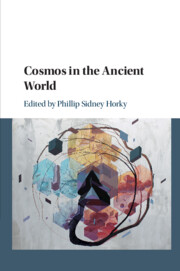Book contents
- Cosmos in the Ancient World
- Cosmos in the Ancient World
- Copyright page
- Dedication
- Epigraph
- Contents
- Contributors
- Acknowledgements
- An Historical Note on Kόσμος – Terminology
- Abbreviations
- Introduction
- Chapter 1 When Did Kosmos Become the Kosmos?
- Chapter 2 Ordering the Universe in Speech
- Chapter 3 Diakosmêsis
- Chapter 4 Aristotle on Kosmos and Kosmoi
- Chapter 5 Order and Orderliness
- Chapter 6 Polis as Kosmos in Plato’s Laws
- Chapter 7 Relating to the World, Encountering the Other
- Chapter 8 Tradition and Innovation in the Kosmos–Polis Analogy
- Chapter 9 Cosmic Choruses
- Chapter 10 All the World’s a Stage
- Chapter 11 The Architectural Representation of the Kosmos from Varro to Hadrian
- Chapter 12 “The Deep-Sticking Boundary Stone”
- Chapter 13 Cosmic Spiritualism among the Pythagoreans, Stoics, Jews and Early Christians
- Afterword
- Bibliography
- Index Locorum
- General Index
Chapter 8 - Tradition and Innovation in the Kosmos–Polis Analogy
Published online by Cambridge University Press: 18 June 2019
- Cosmos in the Ancient World
- Cosmos in the Ancient World
- Copyright page
- Dedication
- Epigraph
- Contents
- Contributors
- Acknowledgements
- An Historical Note on Kόσμος – Terminology
- Abbreviations
- Introduction
- Chapter 1 When Did Kosmos Become the Kosmos?
- Chapter 2 Ordering the Universe in Speech
- Chapter 3 Diakosmêsis
- Chapter 4 Aristotle on Kosmos and Kosmoi
- Chapter 5 Order and Orderliness
- Chapter 6 Polis as Kosmos in Plato’s Laws
- Chapter 7 Relating to the World, Encountering the Other
- Chapter 8 Tradition and Innovation in the Kosmos–Polis Analogy
- Chapter 9 Cosmic Choruses
- Chapter 10 All the World’s a Stage
- Chapter 11 The Architectural Representation of the Kosmos from Varro to Hadrian
- Chapter 12 “The Deep-Sticking Boundary Stone”
- Chapter 13 Cosmic Spiritualism among the Pythagoreans, Stoics, Jews and Early Christians
- Afterword
- Bibliography
- Index Locorum
- General Index
Summary
The analogy between the divine order of the kosmos and the human order of the polis was well established in Greek thought and the basis of a persistent but evolving political cosmology that attempted to link human and divine. The analogy is well attested in both literary evidence and the use of kosmos-derived terms in archaic political structures from several Greek cities. But this analogy was unstable, as philosophical ideas of nature and the divine challenged one side of it and the development of the civic microcosm of the polis, and particularly radical Athenian democracy, challenged the other. The traditional form of the analogy represented by Homeric epic was inherently conservative, in placing Zeus and kings (basileis) in the same position in each side of the analogy, controlling the ordering of cosmic and civic elements respectively, and the office of kosmos, seen particularly in the cities of Crete, replicated that. This chapter explores the use of analogies between macrocosm and microcosm in the political language of the polis, evidenced by epigraphy, and in a range of literary genres from Homeric epic to old comedy, historiography and philosophy.
Keywords
- Type
- Chapter
- Information
- Cosmos in the Ancient World , pp. 164 - 187Publisher: Cambridge University PressPrint publication year: 2019
- 1
- Cited by

